The word “terrorism” – classically defined as violence against civilians for political effect – has become an epithet hurled at despised groups while not against favored ones, a challenge of hypocrisy and propaganda, explains Michael Brenner.
By Michael Brenner
Most Americans think they know what “terrorism” is: what happened on 9/11 or what happened in Orlando: Islamic militants murdering innocent civilians out of hate and in the cause of Islamist jihad. Experience shapes how we understand the world. The Global War on Terror has been oriented accordingly.
More formal definitions of “terrorism” try to extend the term so as to encompass a wider range of violent acts. Here is one: “Terrorism is commonly defined as violent acts (or the threat of violent acts) intended to create fear (terror), perpetrated for a religious, political, or ideological goal, and which deliberately target or disregard the safety of non-combatants (e.g., neutral military personnel or civilians” — Wikipedia.
Here is another: “Criminal acts intended or calculated to provoke a state of terror in the public, a group of persons or particular persons for political purposes are in any circumstance unjustifiable, whatever the considerations of a political, philosophical, ideological, racial, ethnic, religious or any other nature that may be invoked to justify them” — United Nations General Assembly 1994
These formulations strive to be objective and disengaged from individual events however noteworthy. Popular attitudes, the media usages and political oratory tend to revert to the entrenched more common usage.
For “terrorism” – as word and concept – is emotionally charged. Hence, the killings of U.S. soldiers by Dr. Nidal Hassan at Ft. Hood are labeled “terrorism” while the rampage of Dylan Roof in Charleston, South Carolina, in the name of White Supremacy is just mass murder. The killing by the mentally disturbed, apolitical Michael Zehaf-Bibeau (half Bulgarian, half French-Canadian) at the Ottawa Parliament is “terrorism” while the Sandy Hook massacre is not.
Similar inconsistencies are evident in the labels attached to violent actions abroad. “Terrorism” usually is reserved for the actions of sub-national groups; governments of states are exempt even when the purpose of instilling fear is advertised in advance as in “shock and awe.” It was Iraqis, not future historians, who were meant to experience “shock and awe.” The repression of insurrectionist movements of all stripes by existing governments everywhere has a strong psychological component.
So how do we go about refining our definition of “terrorism” so that it can be used to advance understanding rather than as an epithet? A fruitful discussion of “terrorism” requires a specification of the exercise’s purpose. Is it primarily to define the term’s meaning with as much precision as we can – with the companion objective of using it to delineate the various forms and modalities of its multiple manifestations?
If we were to succeed, it then becomes an intellectual tool to illuminate the range of real life phenomena that exhibit characteristics associated with a more general, less precise use of the term. This is the rigorously logical approach taken in science. There, the only acceptable attitude is to seek finer and more refined classifications of observed reality so as to advance our understanding and, thereby, to lay the basis for better prediction of observed phenomena.
A Pejorative Purpose
Many participants in the public discourse about “terror” have a quite different purpose. It is to apply the word as a pejorative to certain acts and actors in order to stigmatize them. This is a political exercise rather than an intellectual one. Hence, the promiscuous appellation “terror” and “state sponsor of terrorism” in accusations that target Iran – however inconsistent that usage is with the terminology applied to the behavior (real or imagined) of other states, e.g. Saudi Arabia and its GCC partners or Turkey.

King Salman of Saudi Arabia and his entourage arrive to greet President Barack Obama and First Lady Michelle Obama at King Khalid International Airport in Riyadh, Saudi Arabia, Jan. 27, 2015. (Official White House Photo by Pete Souza)
The aim is to produce a certain emotional effect that encourages certain types of responses. In popular usage, it is akin to calling someone a “bastard” or a “son of a bitch” as an insult without bothering to determine the legal status of his parents or his mother’s temperament.
There is a third – also loose – use of the term “terror” by the media. They seek the “wow” effect. If eight people die from the violent act of some crackpot, they are just as dead whether an anchor decides to use the word “terror” or not.
Of course, were there clear organization and direction by some identifiable group with a political agenda, the designation might have some meaning. But for the MSM that usually is less important than being able to stick the terror label on an event in order to generate the most excitement and follow-on viewership. If the alleged “terrorist” has a beard, so much the better.
Few in public discourse differentiate and specify traits among a range of phenomenon as a steppingstone toward finer comprehension. Nor do they make much of an effort to expose political motives behind the use of the term “terror” – or withholding the label in other situations.
It is instructive, too, to examine closely “terror” as a legal concept. For that examination highlights that precise stipulations of what is illegal are the sine qua non for making judicial determinations.
However, it is not obvious that legal determinations are at the heart of the matter when we speak of actions that transcend borders in one way or another. Admittedly, the attempt to make such a determination can be important insofar as the United States government and a few others have sought to establish a legal standard as the basis for applying sanctions of one kind or another.
A Reasonable Standard
The effort to come up with an agreed international standard is much more difficult – for readily identifiable reasons. (As with “aggression.”) In either instance, the designation of certain actions as being beyond the legal pale runs up against two recurrent problems.
First is the question of legitimacy. There is in fact no authority that can rightly claim indisputable authority to stipulate illegal behavior – even were it possible to agree on a definition. Second, there is no impartial judicial authority to make the crucial determination of violation and therefore guilt. In short, there is no international “government.”
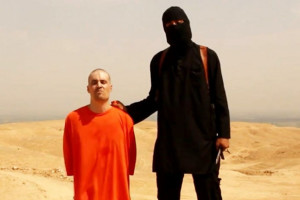
Journalist James Foley shortly before he was executed by an Islamic State operative, known as Jihadi John and identified as Mohammed Emwazi, the target of a drone attack that the Pentagon announced on Thursday.
So what we have is a patchwork of mainly unilateral, nationally prescribed rules that reflect the interests and preferences of each country. As is normal, the more powerful countries try to universalize those rules and norms. That is what has been going on in regard to “terror.”
This is a futile approach. Governments, groups and persons will continue to do what they deem necessary without regard to what Washington or largely Western legal scholars think. Moreover, anyone who challenges the status quo will make the charge of hypocrisy – on justifiable grounds.
Was the unsanctioned (by the United Nations Security Council) American invasion of Iraq legal in any sense of the term? Are Israel’s attacks on Gaza distinguishable from “terror” in any meaningful sense? Are “signature strikes” by drones? Is Saudi Arabia’s air campaign against Yemeni cities? Did the Ukrainian AZOV Brigade, a current White House favorite that sports Nazi insignia and is slated to receive training by the U.S. Army, commit an act of “terrorism” in burning to death Russian civilians in Odessa? Is the murder of civilian scientists in Iran an act of terror – after all it instills fear in colleagues that encourages them to emigrate?
Is it not more productive from a policy perspective to do the following:
- Identify and specify various categories of violent behavior that fall broadly under a loose conception of “terror” – assigning certain traits to each
- Use the resulting taxonomy as the basis for understanding the whys and hows of each instance.
- Make a determination of what might be the most effective way to address them – from a given government’s perspective, NOT from the perspective of some abstract standard of crime and illegality.
- That response may logically include an attempt to mobilize resistance by stigmatizing a given action as “terror.” But that in itself is not a legal exercise or a valid intellectual exercise.
- As to outlawing it – good luck. People have tried to outlaw war and other forms of inter-state and sub-national violence for a few centuries. It won’t and can’t work.
The Torture Model
Perhaps the most notable achievement is the promulgation of international law to set limits on the employment of violence is the Convention Against Torture. It expresses an ethical consensus that emerged from an awareness of common humanity. However, violations of the Convention have been widespread – even among the postwar Western countries.
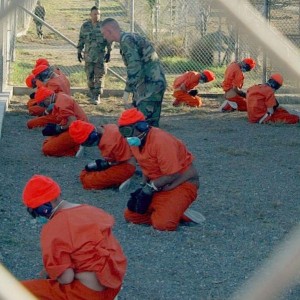
Some of the original detainees jailed at the Guantanamo Bay prison, as put on display by the U.S. military.
The French used torture extensively in Algeria. The United States established an elaborate torture regime under orders from the White House which judged international prohibitions on torture “quaint.” Admittedly, there were some practices that American authorities could not abide; so they were sub-contracted to specialists in Egypt, Syria, Jordan, Morocco, Ethiopia and Thailand. (The treatment of Chelsea Manning, too, meets the U.S. military’s own definition of torture.)
The Orlando episode illustrates these conceptual and intellectual ambiguities. As the news broke, it was easy to reach for the “terrorism” label. Mateen was a Muslim and he had called 911 to pledge his allegiance to the Islamic State.
That was enough even for President Obama whose reaction otherwise was restrained and thoughtful. He declared: “we know enough to say that this was an act of terror.” But only if we apply the simplistic standard just noted. Additional evidence later did appear that indicated that the killer had certain sympathies with the acts of the violent jihadis.
Still, there is not a scintilla of evidence of his having any association with a group which had pointed him in the direction of committing a mass murder – much less instructing him in where and how to commit it. The picture is a muddled psychological mosaic of a mentally unbalanced person who also hated gays, women and blacks. Moreover, as a latent (or perhaps active) homosexual who at the same time loathed gays on religious and other grounds, he was a man at war with himself.
Yet, this complex story quickly was placed in the “Islamic terrorist” category, moving our two presidential candidates to call for intensified bombing of Daesh in Syria and Iraq. If we are striving for analytical insight into the man, his motives and the event’s meaning for policy, we should acknowledgement that Orlando is not mainly an issue of Islamic terrorism.
Intellectual Trap
To do so, is to fall into the intellectual trap of confusing veneer for the underlying cause, of stressing form of expression at the expense of motor force. Meerton was a psychopath with deep-seated, unresolvable mental problems. Their elements mingled in a lethal cocktail mixing his crisis of sexual identity with jihadist imagery and example. It seems reasonable to speculate that he would have gone on some sort of rampage whether ISS existed or not. We don’t know.
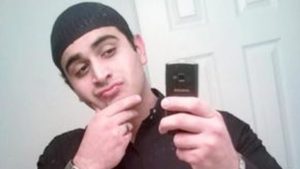
Omar Mateen, identified as the shooter in the massacre of some 49 people at a dance club in Orlando, Florida, on June 12, 2016.
Circumstances created a set of influences that led him down this particular emotional path: the graphically publicized ISIS violence phenomenon, and the prominence given the gay revolution. I suspect that one element in the emotional mix was the unconscious impulse to kill the very self (latent homosexual) which another part of him loathed. This is classic projection. And that likely was the psychological dynamic that drove him to atrocity and tragedy.
A comparison with the Santa Monica kid who seemingly intended to commit the same sort of mass murder would be instructive. No Islamic factor at all involved in that latter case
As to the declaration of allegiance to ISIS during the attack – shouldn’t we consider that this most likely is a last desperate claim to some sort of identity and value from a mentally ill man who has just committed an act of violence against anonymous victims?
It is more emotionally gratifying to suddenly pronounce himself an Islamist agent than to proclaim the unpalatable truth: I am a mental mess, a non-entity who hasn’t the slightest idea why I am doing such a crazy thing!! I know of no killer anywhere who ever has made that statement despite it’s being close to the truth in most such cases.
Giving greater weight to individual psychology strikes me as prudent and well-intended. Yes, there was an Islamist factor at play in the final act. Logically, there seems no reason to view the challenge of explanation as an either/or proposition. Most phenomena are multi-causal – and entail proximate and underlying causes both.
We also should be aware that any society always finds it far easier to blame “them” than to concentrate on the “we.” The “we” in this case is a national society that is gradually unraveling – having loosened its moorings to fixed structures and behavioral norms.
The consequence will be a plethora of odd, often anti-social conduct – much of it can be called nihilistic. It’s observable all around us. Violent acts are a signature manifestation of that troubled reality. And radical Islam provides one trigger.
These intangible elements of post-modern society are exceedingly difficult to pin down or to conceptualize. Yet, it is evident that they have a bearing on how many think, feel and act. It the causal chain that is near impossible to trace. So, too, for the weighing of their importance in determining any individual action.
Who can deny, though, that socialization in a childhood and adolescence of video games raises the threshold of tolerance for violence as something “normal” – and of loosening the connection between act and grisly consequence? Who can deny that the American culture of extreme individual permissiveness has fostered an environment enabling of emotionally self-serving narcissistic behavior? Who can deny the plethora of celebrity models – whether in politics, entertainment, business or wherever – who encourage the blurring of the distinction between virtual and actual realities? Can we honestly deny that there is some link between these socio-cultural developments and the disposition to engage in sociopathic violence?
Lessons Unlearned
What have learned from the “Orlando” episode? Not much. It has not deepened our understanding of transnational terrorist networks since Mateen wasn’t connected to them. It has provided us with no valuable information since this was a solo operation by a mentally ill person.
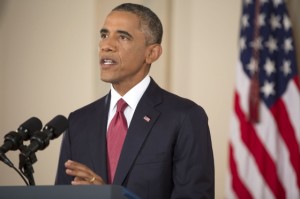
President Barack Obama delivers an address to the nation on the U.S. Counterterrorism strategy to combat ISIL (or ISIS), in the Cross Hall of the White House, Sept. 10, 2014. (Official White House Photo by Pete Souza)
As to the ISIS reference, there is no way to insulate susceptible persons from the influences of violent Islamic fundamentalism in the IT age. They will still be out there even were ISIS, Al Qaeda and all the others to be beaten on the ground. It not within our power to neutralize it no matter how many inter-agency task forces Washington creates to devise counter propaganda.
”Orlando” provides nothing in the way of guidance as how to anticipate and prevent such attacks either. Matten was a mental case – filled with hate generated from within his twisted mind. That hatred was oriented in several directions. The FBI, by happenstance, actually identified the guy and two investigations uncovered no reason to suspect that he might become a mass killer. If there was failure, it was on the part of those who knew him. His wife, especially, should have alerted authorities when he began to prepare his assault.
This narrative does indicate that there are a few things that we might do.
- Think seriously about the legal and ethical aspects of generating pressures on family and friends to report persons who are engaged in concrete preparations for terrorist acts
- Stop wasting FBI and local police resources on silly entrapment schemes that target losers who are recruited by agents and then arrested so as to meet some sort of implicit quota.
- Pay due attention to the nefarious effects of American military actions in the greater Middle East whose dire impact on local Muslim populations has been cited by every perpetrator of terrorist acts here and elsewhere in the West as a primary motivation for their violence.
- Of course, any terrorist attack of this sort will produce greatly magnified casualties so long as we view individual ownership of war weapons as the cornerstone of American democracy
The Attack in Nice
Much of what is said about Orlando above is true of Nice as well. Since it has no singular traits, and since it offers no additional information about violent Salafist networks, the Nice incident is without features of interest to the analyst of terrorism and terrorists.
The seeming redundancy of this tragic event was matched by the redundancy of media coverage and analysts’ interpretations. They immediately declared the incident an act of “terrorism,” i.e. associated with extremist Islamist groups such as Daesh and Al Qaeda- whether by direction or inspiration.
At the time that judgment was pronounced, there was not a scintilla of evidence to support it. That is, unless we appraise any act of mass killing by someone with a Muslim name to be an Islamist “terrorism.” Indeed, as yet there still are no concrete grounds for asserting that there was any association between Mohamed Lahouaiej Bouhlel and those organizations.
Nonetheless, we got an almost instantaneous declaration from France’s defense minister Jean-Yves Le Drian promptly blaming the Daesh terrorist network for inspiring the assault, while its top law enforcement official, Interior Minister Bertrand Cazeneuve said the attacker, who was not previously known to intelligence agencies, may have “radicalized himself very quickly.”
“Quick” is in this case would qualify for a Guinness Book of World Records entry since the attacker’s sister and others testified that he had never entered a mosque in his life – in Tunisia or in France; his friends were a mixed ethnic bag of petty criminals and misfits; had no acquaintanceship in Islamist circles.
At this writing, there are reports that he may have met with an ISIL recruiter who saw in him a target of opportunity. That possible contact would have been only for a duration of days. What to make of it? Assuming such an encounter, the instigator would have had to convince Bouhlel of two things: to commit suicide, and to do so in a Salafist cause – however tenuous the tie.
It is not unreasonable that someone in his erratic state of mind already had a strong suicidal predisposition. It cannot be fostered in a week or two, as has been pointed out by Dr. Jonathan Himmelhoch, Professor of Psychiatry at the University of Pittsburgh and previously at Yale University. Nor is it realistic to postulate, Himmelhoch explains, that an agent could instill a dogmatic doctrine in someone that quickly. Apparently, what is conceivable is that Bouhlet imbibed enough of the Salafist drug to catalyze his suicidal impulses.
On July 18, the Wall Street Journal reported, “François Molins, the chief Paris prosecutor overseeing the investigation into the Bastille Day attack, said Monday that police haven’t found any evidence that Mohamed Lahouaiej Bouhlel explicitly pledged allegiance to Islamic State or had links to any people associated with the Sunni Muslim militant group.
“However, the prosecutor painted a picture of a man who underwent a rapid transformation in the weeks leading up the massacre and became suddenly enthralled with extremist messages and ultra-violent images.
“Data recovered from Lahouaiej Bouhlel’s computer included pictures of militants draped in Islamic State flags and corpses as well as photos of Osama bin Laden and Mokhtar Belmokhtar, the head of an al Qaeda-aligned group called Murabitun. His computer also turned up searches for ‘horrible car accidents’ and ‘shock videos,’ Mr. Molins said.”
Lahouaiej Bouhlel, therefore, falls into the category of the mentally unstable sociopaths who find an outlet for their inner demons through murder. Where and when he fixed on the idea of driving a truck into massed celebrants in Nice is comparatively insignificant.
Even were the ultimate stimulus that prompted him to act was a sudden visualization of himself in the mold of a Daesh suicide killer, there remains the cardinal truth that the necessary condition and readiness and motivation for his atrocious action came from within the man himself.
Michael Brenner is a professor of international affairs at the University of Pittsburgh. mbren@pitt.edu

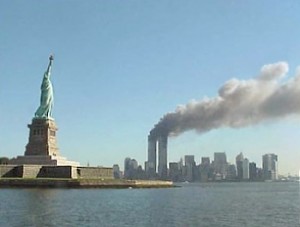
Words have meaning. Different people get different meanings depending on how each individual processes the message. It’s often said, how one man’s terrorist, is another man’s freedom fighter. One violent act will be interpreted as terror by the victim, while the attackers are out in the streets celebrating their brutal accomplishment.
Today, we have such terms as moderate rebel and extreme terrorist. To the victims, such as the Syrian and Iraqi people who feel the pain exhibited by both the moderate and extremist rebel, there is no doubt any distinction. We have hate crimes, and then there are simply crimes which are not hate crimes, but little does it matter to the dead victim. People like John Yoo get paid the big bucks to describe the difference between torture and enhanced interrogation. If Mr Yoo were to be waterboarded twice a day for a lengthy period of time, I would wonder what he might call that. Would he find out physically there is no difference?
If the TSA budget is under strick review would it not be a productive thing to then call the next act of mass violence a terrorist act? I mean how else will the padded down public accept their being felt up by a TSA agent as they try to board a flight to go visit grandma? Words like terrorism work well to double the defense budget, and besides America always needs to have the newest state of the art killing machines, because that’s what the Pentagon needs in order to continue to be the Pentagon.
May I remind everyone, America is the country which due to a presidents indiscretions started a national discussion to whether a BJ is a sexual act, or not. After that I knew we all had crossed the divide between being a rational people to a crowd of legalized crazy’s looking for an answer to a question that shouldn’t have been asked in the first place. The reasoning to this wasn’t what your parents brought you up to believe, as much as it was the determination of what the act detailed to some strange depth. “Just the facts, ma’am”. It’s stuff like this that drives so many to study the law.
We live in a society where your net worth may possibly be the only difference between your going to jail, or your returning to work the next day like nothing ever happened. On one hand your productive life may come to an end, and on the other hand you could be propelled to the White House.
After this, and with football season so close, will someone please explain to me just what is an ‘excessive celebration penalty’?
-I read your piece about his piece here through… You seemed to believe that we have all gone crazy and perhaps that it is defined by an ever enlarging global population with no direct access to common elements cementing us together as simply human and being humane to one another generally, plus, your question in the end about what an excessive celebration penalty is, is: When one spikes the football and then tries to fake bone -from behind- one of his fellow teammates in front of a crowd of thirty thousand people (and did you know: That Daesh, in some places in the world -more often than not (and for good reasons) in the West, means, “DumbAss.” -And it doesn’t depend on _if_ you are one…to quote Clinton-esque.).
Thank you for a very interesting article, Mr Brenner.
I hope to read more from you in the future.
I find it interesting that you have omitted from your list of “terror events” to contemplate the anthrax scare fraudulently attributed to Saddam Hussein.
The fact the MSM and our government was 100% certain of Iraq’s responsibility in this terror attack, was a chief catalyst in our subsequent call to war.
The fact that it became painstakingly clear, after the bombs were dropped, that Saddam had nothing to do with our “anthrax” attack should point your research in a direction where few seem to want to go.
“Terror Fraud”.
Certainly, the eagerness and certainty of Saddam’s culpability in this crime, by all our terror experts, and the catalytic force toward war it engendered, would make clear to any its ruse was a tool toward conflict.
The fraudulent nature of this deliberate “terror scapegoating” should not have gone unnoticed in your article.
Given the willingness to be so dishonest with the American people about who commits acts of terror and why , should set a powerful precedent in your mind when you analyse the various terror events that seem to be set upon the world.
Perhaps your next article could deal with “Terror Fraud”, who uses it , how often it has occurred, and why it serves as a highly effective tool for those who employ it.
That, Mr. Brenner, would be an article well worth reading, too.
The fact that it became painstakingly clear, after the bombs were dropped, that Saddam had nothing to do with our “anthrax” attack should point your research in a direction where few seem to want to go.
—–
The anthrax ‘attacks’ are even more obviously a false flag than 9/11, and 9/11 is screaming obvious.
What rubbish. I have said this many times, go on RationalWiki’s article about 9/11 conspiracies, debunking them. Also, I never heard of the anthrax attacks being a conspiracy.
Thanks for this, alexander. If it weren’t for state terrorism, exemplified by the invasion of Iraq, the assaults on Gaza, etc., and Terror Fraud, exemplified by the anthrax attacks (“The Anthrax Deception” is a great read), 9/11, etc., terrorism would not be a topic of such significance.
If anyone else in creation ever carried out “Shock and Awe” or drone strikes of wedding parties, the purpose of which was/is to terrorize its targets and bend them to the will of Washington, it would be called terrorism. Because the perpetrators were/are the American government, these were virtuous acts, and you’re not a proper patriot if you don’t support them. That’s got to be the thinking, right? How else do they justify such acts? Sure wasn’t self defense.